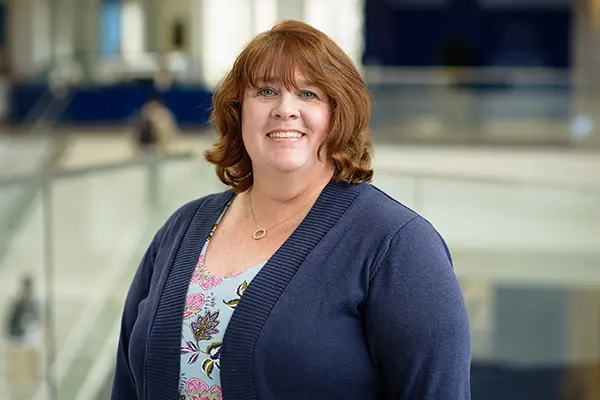Nursing Students To Assist with Federally Funded Project
 Image by Tory Wesnofske
Image by Tory Wesnofske
07/28/2021
By Katharine Webster
Faculty in the Solomont School of Nursing are quickly assembling a team of nurses and nursing students to run clinical trials of experimental point-of-care, rapid COVID-19 testing technologies.
A group of faculty led by Assoc. Prof. Ainat Koren received $935,000 from the National Institutes of Health (NIH) to form a clinical study testing office and team, enlist community partners with COVID-19 testing sites, and recruit nurses and nursing students to test the new products, starting in late summer. The grant is part of the NIH’s Rapid Acceleration of Diagnostics, or RADx, initiative.
 Image by Courtesy
Image by Courtesy
The clinical study testing office also will build a “testing bank” of samples and a database of test results that will be used to compare the performance of the new products to existing, approved tests and equipment. Devices to be tested could be anything from more comfortable nasal swabs to the machines that analyze samples.
The nursing faculty were invited by the UMass Medical School-UMass Lowell RADx team to set up the clinical trials center because nurses are the frontline medical workers who perform most COVID-19 testing. They are therefore best positioned to see whether new rapid testing devices actually work in the field, Koren says.
“Nursing is at the forefront of the pandemic,” she says. “Being an active participant in assisting with the development of accurate point-of-care devices is one of our roles as educators.”
Although rapid tests are currently available under emergency authorization by the U.S. Food and Drug Administration, they have a high rate of false negatives: 20% or more of people who test negative on the rapid tests later find out that they were actually positive for COVID-19, once they get the results from the slower PCR laboratory tests that are the “gold standard” for detecting the virus, according to the U.S. Centers for Disease Control and Prevention. Rapid tests can also yield false positives, leading people to quarantine when they aren’t infected.
 Image by Adrien Bisson
Image by Adrien Bisson
The NIH set up the RADx program to stimulate development of cheap, accurate and easy rapid tests that can be administered and analyzed within minutes at the point of care, including doctors’ offices, clinics, pharmacies, hospitals and mass testing sites, as well as at home.
The RADx program is run by five point-of-care academic centers funded by the NIH, including the Center for Advancing Point of Care Technologies (CAPCaT), a partnership between UMass Medical School and UML and a product of the institutions’ joint venture, the Massachusetts Medical Device Development Center (M2D2). CAPCaT is headed by Prof. Bryan Buchholz, chair of biomedical engineering at UML, and Dr. David McManus, professor and chair of the Department of Medicine at UMass Medical School.
The RADx initiative was set up for both established companies and biotech entrepreneurs to compete, “Shark Tank”-style, for funding at each stage of product development. They get assistance from CAPCaT or the other point-of-care centers as well as businesses that can help with commercialization.
Now, those with product prototypes that have shown promise in the earlier phases are ready for the final stage: clinical trials.
 Image by Richard Pasley
Image by Richard Pasley
“The companies chosen went through rigorous review,” Koren says. “The focus is to assist the scientists to check their devices in the field and compare the results to current testing, so that they can see the sensitivity and reliability of the device as well as its usability.”
Koren serves on the advisory board of CAPCaT and on the executive board of M2D2, making her a logical choice to lead the clinical trials effort as principal investigator. Other faculty serving as co-investigators are Nursing Chair and Assoc. Prof. Heidi Fantasia, Assoc. Prof. Comfort Enah and Clinical Asst. Prof. Lisa Marchand. Fantasia and Enah will assist with advising companies, implementing the research protocols and forming community partnerships, while Marchand will serve as clinical director.
The trials will be conducted in partnership with a medical group that offers drive-through testing, the university’s own testing clinic, and possibly a mass testing event. Koren says that she hopes to partner with a local hospital, as well.
At each site, nurses and nursing students will ask patients who come in for testing if they are willing to take a second test with an experimental device to aid in the research. If the patient consents, then they will answer a few questions and get a second test. Results from the tests using the experimental devices will be compared to results on the same samples using “gold standard” devices.
 Image by Richard Pasley
Image by Richard Pasley
Koren is seeking nursing students to help with the clinical trials. All of them will go through training by the university’s Office of Research Integrity on how to conduct human subject research, as well as training in the testing protocols.
Nursing student Caroline Owusu, a rising junior who has worked remotely on other research projects with Koren, says she is excited to help with the clinical trials and to gain more research insights.
“I’m just looking forward to getting hands-on experience as a nurse,” says Owusu. “And this research is very important in helping us keep up the pace in transitioning into a more normal world.”




